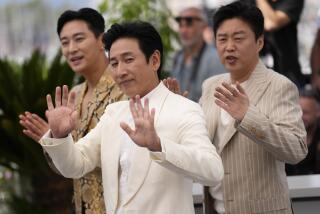Jackie Chan’s son busted in major Chinese drug crackdown
- Share via
Reporting from Beijing — His movies have flopped time and again and his dad, Jackie Chan, has reportedly disinherited him. But, thanks to Chinese police, actor-singer-playboy Jaycee Chan can at least say he’s been cast in a major new role that’s turning heads: bad example.
Busted by Beijing cops on drug charges along with a Taiwanese actor pal, Chan’s mug was plastered all over Chinese media Tuesday. State-run television news aired an extensive report on the duo, including footage of police searching Chan’s home.
“What is this?” an investigator repeatedly asked, pulling small plastic bags and other containers out of a filing cabinet. “Marijuana,” Chan, 31, answered meekly.
His friend, Kai Ko, meanwhile, turned on the waterworks. “I’ve set a very bad example,” the 23-year-old performer said in a tearful confession, recorded in police custody while dressed in a blue-and-yellow detention center shirt.
Chan and Ko are among at least nine celebrities named and shamed in a major drug crackdown that’s been sweeping the Chinese capital in recent months, netting users of pot, methamphetamine, ketamine and other illicit substances. Thousands of ordinary citizens have also been taken into custody; police said between late April and early August they had arrested 3,400 alleged drug users, up 77% from a year earlier.
Some of the police tactics have raised eyebrows. In one much-buzzed about incident this month, officers — apparently acting on a tip — swarmed a bar called 2 Kolegas, barred the doors and ordered all patrons to provide urine samples under the watchful eyes of officers.
An Australian journalist who happened to be in the establishment reported that at least nine patrons, including foreigners, were taken into custody after the instant tests turned up positive results — although no one appeared to have actually been caught buying, selling or carrying illegal substances. In China, drug consumption is an offense that can land one in short-term detention.
Exactly what’s prompted the crackdown isn’t clear. In June, President Xi Jinping delivered a speech timed to the International Day Against Drug Abuse and Illicit Trafficking, calling for “forceful measures” to wipe out drugs. But even before then, Beijing police were announcing busts, including one in May that netted more than two-dozen foreigners.
“It’s hard to know why the government does what they do,” said Gernot Klantschnig, a professor at the University of Nottingham’s campus in Ningbo who has studied aspects of drug-control policy in China.
“In general, in recent years, there has been a trend toward somewhat less punitive” policies toward drug users, he said, and a greater emphasis on “harm-reduction” efforts, including methadone clinics and needle-exchange programs.
In the last decade or so, the number of drug users registered and tracked by authorities in China has more than doubled, from about 1 million to over 2 million, according to the Office of the National Narcotics Control Commission. Heroin remains the drug of choice among this population. But methamphetamine and other synthetic drugs, such as ecstasy, are increasing in popularity, particularly among young urbanites with disposable incomes.
Although those statistics suggest China’s drug-abuse rate is substantially lower than many other countries, Klantschnig cautioned that such data may significantly understate the size of the country’s drug market.
Casual users who do not come into contact with law enforcement or other government agencies may not be included in such reports, and unlike in countries such as the U.S., there are no good household surveys on drug issues, he said.
Wu Liwei, a Beijing attorney who represented a reality show singing star, Li Daimo, in a drug case this past spring, said he believes usage rates have not risen markedly in recent years, although methamphetamine cases are up somewhat.
“The crackdown is creating a misimpression among the public that drug use is way up, and celebrities are the main group of offenders,” he said.
Nevertheless, Wu said he’s not opposed to the government making an example out of famous people who violate the law.
“These cases can have a strong impression on fans and the public,” he said. “It can function as a way to educate people.”
In entertainment circles, many say this summer’s crackdown is reminiscent of a similar campaign about a decade ago. Some are concerned that authorities this time may take additional punitive measures against celebrities – such as instructing censors who control the release of films, TV shows and music to withhold approval from anyone convicted of drug offenses.
The state-run New China News Agency reported recently that a group called the Beijing Trade Assn. for Performances had organized 42 entertainment agencies in the city to sign a pledge promising not to hire actors with a history of drug use.
But attempts by numerous reporters, including The Times, to contact the association to verify the report proved fruitless. Reached by the Xiaoxiang Morning News last week, Yang Hongbin, the group’s general secretary, clarified that the pledge was a suggestion rather than a requirement.
“We suggest the entertainment agencies not hire celebrities who have a history of drug use, especially those who are still going through rehab,” Yang told the paper. “Our purpose is to lower this kind of impact and also serve as a warning to those celebrities to let them know how serious this is.”
A person familiar with one of Chan’s upcoming film projects suggested that producers could opt to simply cut his minor part out of the movie, rather than risk the prospect of being hassled during the censorship process.
Other Chinese entertainers, however, have bounced back from narcotics raps in the past.
Zhang Yibai, a director who was detained in December 2009 on the relatively minor offense of drug consumption, filmed a new movie this year. And Luo Qi, a top vocalist in the 1980s who became addicted to heroin after losing her eye in a drunken fight in the early 1990s, staged a comeback about 10 years ago and this past winter appeared on the popular TV contest show “I Am a Singer.”
For now, Chan and Ko first have to reckon with their legal situations. Ko — who just two years ago appeared in an anti-drug public service campaign — has been charged with drug consumption, which carries a 14-day detention term.
Chan, however, is facing the much more serious charge of “accommodating drug users,” which generally refers to providing others a place to take drugs.
Wu, the attorney, said that charge can carry a sentence of three years in prison, but that can be reduced if a defendant shows contrition and is cooperative. “It’s too early to say in his case what will happen,” Wu said.
Fans of Jackie Chan are watching to see whether the comedic action star, who himself has served as an anti-narcotics “ambassador” in China, will publicly come to his son’s defense. The elder Chan has previously evinced frustration with his son’s life choices and several years ago announced that he planned to give his fortune to charity, rather than pass it along to Jaycee.
“If he is capable, he can make his own money,” Jackie Chan said at the time. “If he is not, then he will just be wasting my money.”
For now, the younger Chan seems to have retained the support of his management.
In a statement, M’Stones International apologized to the public for the “social impact” of the performer’s alleged drug use and said they would “help him return to the right path.”
Tommy Yang and Nicole Liu in The Times’ Beijing bureau contributed to this report.For news out of China, follow @JulieMakLAT on Twitter
More to Read
Sign up for Essential California
The most important California stories and recommendations in your inbox every morning.
You may occasionally receive promotional content from the Los Angeles Times.











